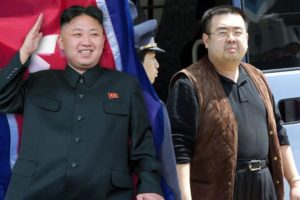Special to WorldTribune.com
 By Donald Kirk
By Donald Kirk
Kim Jong-Nam showed the warm and human face of North Korea’s dynastic family.
You had to like the guy, judging from sightings in the gambling enclave of Macau, across the Pearl River estuary from Hong Kong off China’s southeastern coast. One time he was spotted in a Macao bus. Another time he was seen at a doorway with a funny little smile on his face.
Then, for a while, he dropped out of the news. Speculation was he’d been told to keep his mouth shut and stay out of sight after making disparaging comments about his younger half-brother, “Respected Leader” Kim Jong-Un. He had had the nerve to say he doubted if the kid would last long in power.

You can’t imagine any offense much worse than suggesting the man on the throne might be deposed. Perhaps it was a case of sour grapes.
Kim Jong-Nam, at 45 a dozen years older than Kim Jong-Un, had been cast aside as a potential heir by their father, Kim Jong-Il, after trying 16 years ago to enter Japan on a fake Dominican Republic passport. Apparently, the “Dear Leader” didn’t care for the excuse that his oldest son, born of an actress who died in Moscow, had yearned to visit Disneyland Tokyo with his kid.
From then on, Jong-Un, not Jong-Nam, was destined as Kim Jong-Il’s successor, and he’s been ruling with an iron fist since taking over after his father’s death more than five years ago.
Not content with knocking off his uncle-in-law, Jang Song-Thaek, married to his father’s younger sister, Kim Jong-Un methodically ordered the executions of all those connected with Jang plus many of their family members.
That word comes from an authoritative source, Kang Chol-Hwan, who recounts his own tale of imprisonment and escape from North Korea in his classic, “The Aquariums of Pyongyang.”
Perhaps Kim Jong-Nam was lucky to have lived as long as he did.
He survived an assassination attempt seven years ago a staged car “accident” similar to any number in which North Korean have been killed in “accidents” after falling out of favor.
Now it seems Kim Jong-Nam has met his fate, the victim of chemicals smeared on his face, presumably at the behest of North Korean agents, by at least one woman identified as Vietnamese at Kuala Lumpur International Airport outside the Malaysian capital.
Seems the chubby fellow, cut off from funding by his chubbier half-brother, had been moving now and again around the region, partly for fun, partly to evade agents who were out to get him.
The demise of Kim Jong-Nam is another of many innumerable tragedies that have befallen those on the wrong side of power in Pyongyang. What could be sadder than that of the hundreds of thousands consigned over the decades to the country’s vast prison camps?
And what about the hundreds of South Koreans who’ve been captured or kidnapped or otherwise fallen into the clutches of the regime? Considering the ferocity of Kim Jong-Un’s rule, we may be pretty sure he’s not going to show the quality of mercy by freeing any of these poor souls, mostly fishermen whose boats had strayed into North Korean waters.
One who seems destined never to get out is Hwang Won, a TV producer who was on a Korean Air plane hijacked over South Korea in December 1969 and forced to land near the North Korean east coast port of Wonsan. His son, Hwang In-Cheol, who was two at the time, has no idea why his father was among 11, including the pilot and co-pilot, whom North Korea refused to send home after freeing 39 passengers on Valentine’s Day, Feb. 14, 1970.
At the gates of the unification ministry in central Seoul on the latest Valentine’s Day anniversary, Hwang read an impassioned statement protesting the reluctance of Korean officials to press for his father’s release. They politely sympathize, then tell him there’s nothing they can do and advise him to cool it.
You wonder what’s in it for North Korean rulers to display such cruelty. Was it totally coincidental that Kim Jong-Un ordered the firing of an advanced model of a mid-range missile the day of his brother’s murder?
Kidnapping South Koreans to the North and killing foes of the regime such individual tragedies show the harsh insecurity of a regime that survives on chest-beating rhetoric while squandering resources on nukes and missiles.
Donald Kirk has been covering war and peace in Asia for decades. He’s at [email protected]
